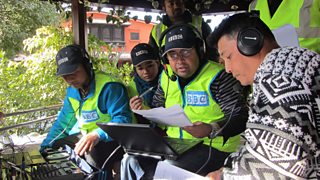Communication in a crisis
Jitendra Raut
Senior producer, 主播大秀 Nepali Service

主播大秀 Nepali's Jitendra Raut interviews an army representative during an earthquake scenario as part of 主播大秀 Media Action's lifeline training.
My home, the city of Kathmandu has endured earthquakes for all its life. Major earthquakes have levelled the whole city and even killed its king.
After every quake, the city has rebuilt itself and rebounded from its losses. But today, unplanned and unregulated building growth in a city of almost four million has made it even more vulnerable to earthquakes.
That's why I took part in 主播大秀 Media Action training a few weeks ago about how best to communicate with people in times of crisis, such as the critical hours and days after an earthquake hits.
'Joined-up' approach
The training brought together 主播大秀 World Service journalists and producers like myself with 主播大秀 Media Action staff and representatives from Nepal's Ministry of 主播大秀 Affairs, police and army disaster response, the Red Cross, UN bodies and non-governmental organisations.
The emphasis was on learning how to create a joined-up response to crises: how we can all work together to communicate timely and reliable information – whether it's through radio, TV, community meetings, posters or SMS – to people when they need it most.
The power of radio
The training addressed a number of different crises scenarios, but on day three, we ran a simulation of an earthquake in Kathmandu which tested how we could provide such vital lifeline information to save lives.
We practiced on a suitcase radio kit, which showed us how, with even a small but dedicated and motivated team, it's possible to quickly set up a makeshift but fully functioning FM radio station.
My colleagues set up an antenna in a tree, assembled a studio in a shed and interviewed 'traumatised' people, played by actors, and humanitarian staff, experts and government officials.
Information is aid
Even though it was a mock scenario acted out in the grounds of a Kathmandu hotel, I am sure the knowledge and skills acquired will help us act similarly in a real-life situation.
I learned that when people are in desperate need, information is aid and that, just as in we do in our news and current affairs programmes day in and day out, the 主播大秀 values of balance, credibility, accuracy, trust and respect are all the more important during a crisis.
While I hope and pray that such a crisis doesn't hit Kathmandu and Nepal, I and my team are now far more prepared to respond and, hopefully, help save lives.
Related links
From the 主播大秀 Media Action blog:
